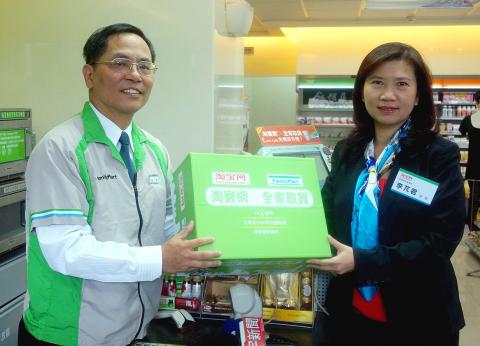Taobao.com (淘寶), China’s largest online shopping Web site, has partnered with FamilyMart (全家) convenience store chain to launch a pick-up service in Taiwan, the chain announced yesterday.
FamilyMart said it is the first convenience store chain in Taiwan to offer a cross-border pick-up service, which is expected to boost the growth of its pick-up service by more than 10 percent.
Convenience store pick-up services have become increasingly popular among online buyers and sellers because there is no time constraint and they are less costly, FamilyMart president Chang Ren-dun (張仁敦) said.

Photo: Yang Ya-min, Taipei Times
The business opportunities provided by Taiwan’s online shopping stores are estimated to be worth NT$100 billion (US$3.39 billion) a year, he said.
Daphne Lee (李芃君), director of overseas business for Taobao.com, said that demand for the company’s products is growing in Taiwan, where Taobao.com has 800,000 members.
With nearly 2,900 stores across the nation, FamilyMart offers buyers a more convenient service for online shopping, Lee said.
Under the arrangement that took effect yesterday, customers in Taiwan can choose the pick-up service after they place their orders with Taobao.com, with an estimated delivery time of four to seven days, she said, adding that buyers will be able to track their orders and get delivery information.
In Taiwan, one out of every seven people has used a convenience store pick-up service at least once, according to freight logistics services.
The nation’s four major convenience store chains handle more than 1 million packages a month, and the market for online shopping pick-up services is estimated at NT$500 million a year, freight companies said.

Hon Hai Precision Industry Co (鴻海精密) yesterday said that its research institute has launched its first advanced artificial intelligence (AI) large language model (LLM) using traditional Chinese, with technology assistance from Nvidia Corp. Hon Hai, also known as Foxconn Technology Group (富士康科技集團), said the LLM, FoxBrain, is expected to improve its data analysis capabilities for smart manufacturing, and electric vehicle and smart city development. An LLM is a type of AI trained on vast amounts of text data and uses deep learning techniques, particularly neural networks, to process and generate language. They are essential for building and improving AI-powered servers. Nvidia provided assistance

STILL HOPEFUL: Delayed payment of NT$5.35 billion from an Indian server client sent its earnings plunging last year, but the firm expects a gradual pickup ahead Asustek Computer Inc (華碩), the world’s No. 5 PC vendor, yesterday reported an 87 percent slump in net profit for last year, dragged by a massive overdue payment from an Indian cloud service provider. The Indian customer has delayed payment totaling NT$5.35 billion (US$162.7 million), Asustek chief financial officer Nick Wu (吳長榮) told an online earnings conference. Asustek shipped servers to India between April and June last year. The customer told Asustek that it is launching multiple fundraising projects and expected to repay the debt in the short term, Wu said. The Indian customer accounted for less than 10 percent to Asustek’s

‘DECENT RESULTS’: The company said it is confident thanks to an improving world economy and uptakes in new wireless and AI technologies, despite US uncertainty Pegatron Corp (和碩) yesterday said it plans to build a new server manufacturing factory in the US this year to address US President Donald Trump’s new tariff policy. That would be the second server production base for Pegatron in addition to the existing facilities in Taoyuan, the iPhone assembler said. Servers are one of the new businesses Pegatron has explored in recent years to develop a more balanced product lineup. “We aim to provide our services from a location in the vicinity of our customers,” Pegatron president and chief executive officer Gary Cheng (鄭光治) told an online earnings conference yesterday. “We

LEAK SOURCE? There would be concern over the possibility of tech leaks if TSMC were to form a joint venture to operate Intel’s factories, an analyst said Taiwan Semiconductor Manufacturing Co (TSMC, 台積電) yesterday stayed mum after a report said that the chipmaker has pitched chip designers Nvidia Corp, Advanced Micro Devices Inc and Broadcom Inc about taking a stake in a joint venture to operate Intel Corp’s factories. Industry sources told the Central News Agency (CNA) that the possibility of TSMC proposing to operate Intel’s wafer fabs is low, as the Taiwanese chipmaker has always focused on its core business. There is also concern over possible technology leaks if TSMC were to form a joint venture to operate Intel’s factories, Concord Securities Co (康和證券) analyst Kerry Huang (黃志祺)